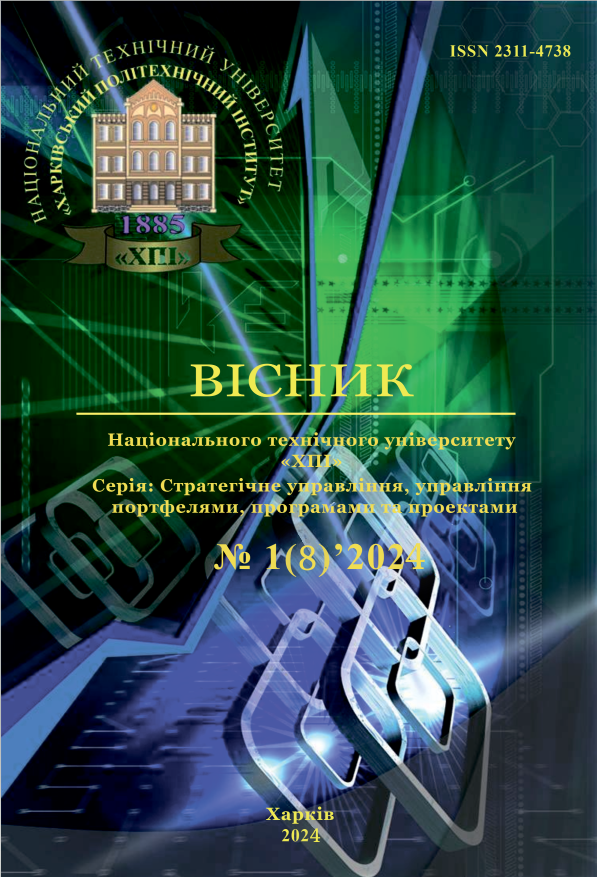EFFICIENCY OF COMPETENCE CENTERS COMBINATION IN INFORMATION SYSTEMS MANAGEMENT BASED ON A GAME-THEORETIC APPROACH
DOI:
https://doi.org/10.20998/2413-3000.2024.8.10Keywords:
management information system; center of competence; game-theoretic approach; hierarchical game; distributed controlAbstract
The implementation of information management systems in companies and the tasks to be solved for their support were considered. It was decided that in order to increase the efficiency of the support process, there is a need to create a center or centers of competences on the side of the client-customer of the information management system. It was shown that the functional model of a system management with several control centers and one managed entity uses a two-level management hierarchy that implements the necessary management functions and is aimed at minimizing costs. On the basis of the game-theoretic model, the synergistic expediency of combining the efforts of competence centers in the management of a certain object, which is a participant in a hierarchical game, has been confirmed. An arbitrary system with two centers of competence was studied as a two-level hierarchical game. The conditions of antagonism, equilibrium of the game were analyzed, and the effectiveness of strategies of merger or cooperation of player control centers in a system with distributed control was confirmed. It was concluded that in the management of complex continuous systems, the unification of competence centers proves its effectiveness in comparison with individual management and facilitates the regulated process of implementing information systems in companies.
References
Michael Doane. The SAP Green Book A Business Guide for Effectively Managing the SAP Lifecycle: SAP PRESS, 2012. 323 p.
Myerson R.B. Game theory: analysis of conflict. London: Harvard Univ. Press. 2001. 4th printing. 568 p.
Johnson P., Johansson E., Sommestad T. & Ullberg J. A tool or enterprise architecture analysis. In Enterprise Distributed Object Computing Conerence, 2007. EDOC 2007. 11th IEEE International, pp. 142-143.
Nisan N., Roughgarden T., Tardos E., Vazirani V.V. Algorithmic Game Theory. Cambridge University Press, New York, NY, USA. 2007. 776p.
Нейман Д., Моргенштерн О. Теорія ігор та економічна поведінка. Наука, 1970. 708 с.
Інтрилігатор М. Математичні методи оптимізації і економічна теорія. Айріс-пресс, 2002. 606 с.
Гермейер Ю.Б. Ігри з непротилежними інтересами : серія «Оптимізація та дослідження операцій». 2016. 328 с.
Морозов В.В. Основи теорії ігор. Видавництво МДУ, 2002. 275 с.
Persson T., Tabellini G. Political Economics: Explaining Economic Policy. Cambridge, MA: MIT Press. 2000. 533 p.
McKelvey R. Game forms for Nash implementation of general social choice correspondences. Social Choice and Welfare. 2009. №6. P. 139 - 156.
Nicherson D., Sandier T. Intertemporal incentive allocation in simple hierarchies. Mathematical Social Sciences. 2004. Vol. 7. №1. P. 33 - 57.
Grigorian, T.G., Titov, S.D., Gayda, A.Y., Koshkin, V.K. A general game-theoretic approach to harmonization the values of project stakeholders. 2018. Advances in Intelligent Systems and Computing, vol 689. Springer.
Chernov, S., Titov, S., Chernova, L., Chernova, L., Trushliakova, A. The Behavior Antagonism in the IT Project Management. SIST 2023 - 2023 IEEE International Conference on Smart Information Systems and Technologies, Proceedings, 2023, pp. 114–119.
Downloads
Published
Issue
Section
License

This work is licensed under a Creative Commons Attribution-NonCommercial-ShareAlike 4.0 International License.
Our journal abides by the Creative Commons copyright rights and permissions for open access journals.
Authors who publish with this journal agree to the following terms:
Authors hold the copyright without restrictions and grant the journal right of first publication with the work simultaneously licensed under a Creative Commons Attribution-NonCommercial-ShareAlike 4.0 International License (CC BY-NC-SA 4.0) that allows others to share the work with an acknowledgement of the work's authorship and initial publication in this journal.
Authors are able to enter into separate, additional contractual arrangements for the non-commercial and non-exclusive distribution of the journal's published version of the work (e.g., post it to an institutional repository or publish it in a book), with an acknowledgement of its initial publication in this journal.
Authors are permitted and encouraged to post their published work online (e.g., in institutional repositories or on their website) as it can lead to productive exchanges, as well as earlier and greater citation of published work.

